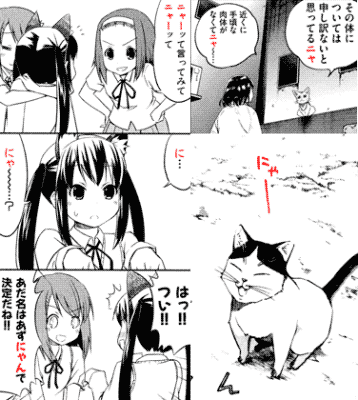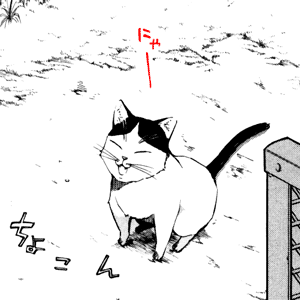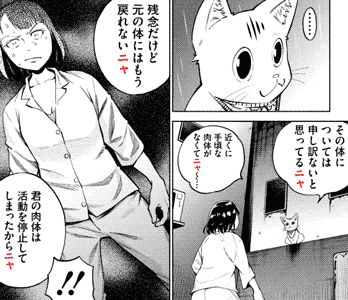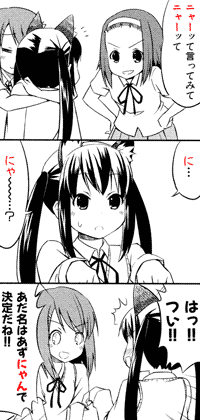In Japanese, nya にゃ, nyan にゃん, or nyaa にゃー (also spelled にゃあ and にゃぁ), or "nyah," are onomatopoeia that mean "meow," the sound that cats make. That is, in order to say "meow" in Japanese, one of those words are used.
They can also be spelled with katakana, as ニャ, ニャン, ニャー, ニャア, and ニャァ. And there are other variants, too, like myaa みゃー.
Manga: Doll-Kara, どるから (Chapter 1)
Manga: Nyan Koi! にゃんこい! (Chapter 17)
Usage
English only has one way to say "meow," while Japanese has multiple, different ways. This is likely because the Japanese language simply makes more use of onomatopoeia than the English language.
While English spelling can be confusing and erratic at times, Japanese spelling is very consistent and straightforward, so it's easy to transcribe sounds and variants of sounds in Japanese, so you have a shorter nya, a longer nyaa, a more nasal nyan, and so on.
- Context: a "cat," neko 猫.
- nyaaa
にゃーー
Meeoow.- The prolonged sound mark ー can drag for as long as the sound goes on.
- chokon
ちょこん
*doing something while being small*
The word nyaa にゃあ and its variants are strongly associated with the cats that meow them. There's a bunch of series with nya or something in their titles.
- Nyan Koi にゃんこい! is a series about "love," koi 恋, and a protagonist with cat allergy that got a curse that makes him turn into a cat.
- www.nyan.cat is the website where a cat wrapped in a toaster keeps says nya. It's a meme for some reason.
- nyandere ニャンデレ is a type of dere that becomes cat-like when dere'ing.
- nyanko にゃんこ means a "kitty." And since wan わん is "bark," the word wanko わんこ means a "puppy." The normal names would be neko 猫, "cat," koneko 子猫, "kitten," inu 犬, "dog," and koinu 子犬, "puppy." See also: animals in Japanese.
Some characters have nya in their names perhaps because it sounds cute like cats, or it could be a mere coincidence.
- Nyaruko ニャル子 is a character whose name comes form the H.P. Lovecraft character "Nyarlathotep," Nyaruratotepu ニャルラトホテプ. Considering the character doesn't seem to share anything with Nyarlathotep besides the name, it's possible the author chose to base the character on Nyarlathotep JUST for the nickname to have nya in it.
- Satanya サタニャ, "Satania," is the nickname for Satanikia サタニキア, "Satanichia," in the series Gabriel DropOut.
At The End of Sentences
In manga and anime, sometimes you have a cat character that speaks, or a cat girl that speaks, and they will sometimes end their sentences with nya. This is called a gobi 語尾 and is just intended to give personality to the way the character's speak. Some examples of how it's used:
| With nya. | Normal. |
|---|---|
| sou nya! そうにゃ! That's right! |
sou da! そうだ! |
| sou da nya そうだにゃ I think so, too. |
sou da na そうだな |
| nyanda to!? にゃんだと What did [you] say? |
nanda to?! なんだと?! |
| nyani?! にゃに?! What!? |
nani?! なに?! |
| nyanka kowai にゃんか怖い That seems scary. |
nanka kowai なんか怖い |
An example:
- Context: an old man saves a cat from truck-kun and ends up getting killed in the process. The cat, thankful, puts him in the body of a young girl, then explains the situation to him.
- sono karada ni tsuite wa {moushi-wake nai} to omotteru nya
その体については申し訳ないと思ってるニャ
About that body, [I] feel {sorry} meow.
I'm sorry about you ending up in that body, meow. - chikaku ni {tegoro na} nikutai ga nakute nya~~...
近くに手頃な肉体がなくてニャ~~・・・
There weren't any {suitable} bodies nearby, [you see], meow~~.- ~ga nakute na ~がなくてな - "there weren't [...], you see."
- {zan'nen da} kedo moto no karada ni wa mou modorenai nya
残念だけど元の体にはもう戻れないニャ
{It's unfortunate}, but you can't return to your former body anymore, meow.- modorenai - negative form of modoreru 戻れる, potential form of modoru 戻る, "to return."
- kimi no nikutai wa katsudou wo teishi shite-shimatta kara nya
君の肉体は活動を停止してしまったからニャ
Because your body has ceased activity, meow.
- You're dead, meow.
- ~wo teishi suru - "to cease," "to stop," suru-verb.
Honorific Suffix
The word nyan にゃん may be used as a cutesy, diminutive honorific suffix after someone's name, like ~san ~さん, or more close to ~chan ~ちゃん in this case.
- Context: Nakano Azusa 中野梓, a new club member, puts on "cat ears," nekomimi 猫耳.
- nyaa tte itte-mite, nyaa tte
ニャーッて言ってみて ニャーッて
Try saying "meow," [say] "meow." - ni... nya~~...?
に・・・にゃ~~・・・?
M... meow~~...? - ha'! tsui!!
はっ!!つい!!
Ah!! [I did it without thinking]!! (in the sense of not intending to say it, but getting carried away.) - ada-na wa Azunyan de kettei da ne!!
あだ名はあずにゃんで決定だね!!
[It] is decided: [your] nickname will be Azunyan!! (Azusa plus "meow.")
Puns
Sometimes, nyaa is used in other word play involving cats. Notably:
- ni-gatsu juu-ni-nichi
2月22日
February, day 22.
Is also known as the "Cat's Day," neko no hi 猫の日, because ni, ni, ni 222 is close to meowing nya, nya, nya.
"To Meow" in Japanese
To say the verb "to meow" in Japanese, you would use naku 鳴く, which means "(for an animal) to make a sound," i.e. "to cry." Observe:
- neko wa "nyaa" to naku
猫は「にゃあ」と鳴く
Cats make the sound "meow."
Cats meow "meow." - inu wa "wan" to naku
犬は「わん」と鳴く
Dogs make the sound "woof."
Dogs bark "woof."
This isn't to be confused with the homonym naku 泣く, which means "to cry (tears)," instead.




My cat is a bengal mix and she does not say meow, she says nya and nye,too!Bengal cats talk like this :D
ReplyDelete